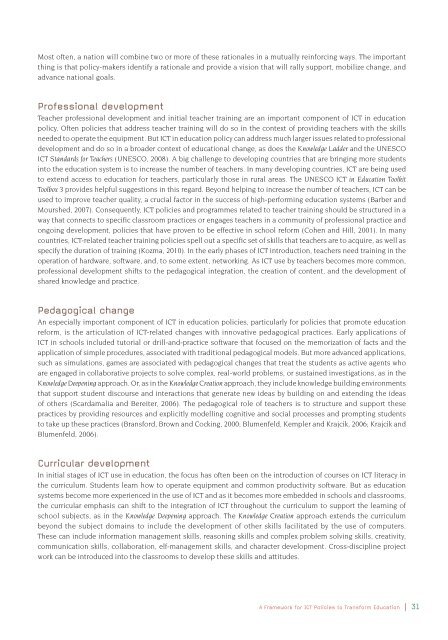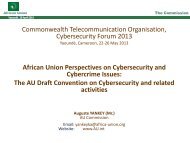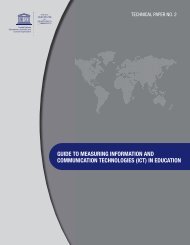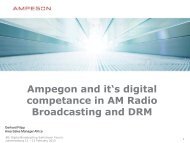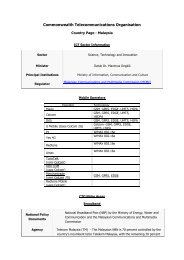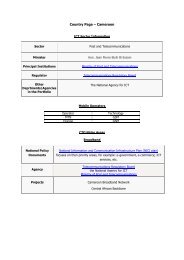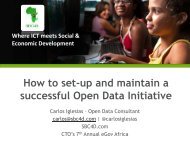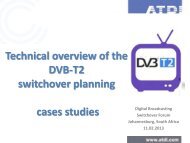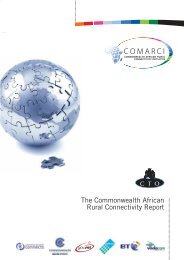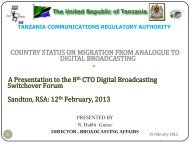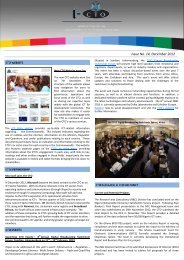Transforming education: the power of ICT policies - Commonwealth ...
Transforming education: the power of ICT policies - Commonwealth ...
Transforming education: the power of ICT policies - Commonwealth ...
Create successful ePaper yourself
Turn your PDF publications into a flip-book with our unique Google optimized e-Paper software.
Most <strong>of</strong>ten, a nation will combine two or more <strong>of</strong> <strong>the</strong>se rationales in a mutually reinforcing ways. The important<br />
thing is that policy-makers identify a rationale and provide a vision that will rally support, mobilize change, and<br />
advance national goals.<br />
Pr<strong>of</strong>essional development<br />
Teacher pr<strong>of</strong>essional development and initial teacher training are an important component <strong>of</strong> <strong>ICT</strong> in <strong>education</strong><br />
policy. Often <strong>policies</strong> that address teacher training will do so in <strong>the</strong> context <strong>of</strong> providing teachers with <strong>the</strong> skills<br />
needed to operate <strong>the</strong> equipment. But <strong>ICT</strong> in <strong>education</strong> policy can address much larger issues related to pr<strong>of</strong>essional<br />
development and do so in a broader context <strong>of</strong> <strong>education</strong>al change, as does <strong>the</strong> Knowledge Ladder and <strong>the</strong> UNESCO<br />
<strong>ICT</strong> Standards for Teachers (UNESCO, 2008). A big challenge to developing countries that are bringing more students<br />
into <strong>the</strong> <strong>education</strong> system is to increase <strong>the</strong> number <strong>of</strong> teachers. In many developing countries, <strong>ICT</strong> are being used<br />
to extend access to <strong>education</strong> for teachers, particularly those in rural areas. The UNESCO <strong>ICT</strong> in Education Toolkit<br />
Toolbox 3 provides helpful suggestions in this regard. Beyond helping to increase <strong>the</strong> number <strong>of</strong> teachers, <strong>ICT</strong> can be<br />
used to improve teacher quality, a crucial factor in <strong>the</strong> success <strong>of</strong> high-performing <strong>education</strong> systems (Barber and<br />
Mourshed, 2007). Consequently, <strong>ICT</strong> <strong>policies</strong> and programmes related to teacher training should be structured in a<br />
way that connects to specifi c classroom practices or engages teachers in a community <strong>of</strong> pr<strong>of</strong>essional practice and<br />
ongoing development, <strong>policies</strong> that have proven to be effective in school reform (Cohen and Hill, 2001). In many<br />
countries, <strong>ICT</strong>-related teacher training <strong>policies</strong> spell out a specifi c set <strong>of</strong> skills that teachers are to acquire, as well as<br />
specify <strong>the</strong> duration <strong>of</strong> training (Kozma, 2010). In <strong>the</strong> early phases <strong>of</strong> <strong>ICT</strong> introduction, teachers need training in <strong>the</strong><br />
operation <strong>of</strong> hardware, s<strong>of</strong>tware, and, to some extent, networking. As <strong>ICT</strong> use by teachers becomes more common,<br />
pr<strong>of</strong>essional development shifts to <strong>the</strong> pedagogical integration, <strong>the</strong> creation <strong>of</strong> content, and <strong>the</strong> development <strong>of</strong><br />
shared knowledge and practice.<br />
Pedagogical change<br />
An especially important component <strong>of</strong> <strong>ICT</strong> in <strong>education</strong> <strong>policies</strong>, particularly for <strong>policies</strong> that promote <strong>education</strong><br />
reform, is <strong>the</strong> articulation <strong>of</strong> <strong>ICT</strong>-related changes with innovative pedagogical practices. Early applications <strong>of</strong><br />
<strong>ICT</strong> in schools included tutorial or drill-and-practice s<strong>of</strong>tware that focused on <strong>the</strong> memorization <strong>of</strong> facts and <strong>the</strong><br />
application <strong>of</strong> simple procedures, associated with traditional pedagogical models. But more advanced applications,<br />
such as simulations, games are associated with pedagogical changes that treat <strong>the</strong> students as active agents who<br />
are engaged in collaborative projects to solve complex, real-world problems, or sustained investigations, as in <strong>the</strong><br />
Knowledge Deepening approach. Or, as in <strong>the</strong> Knowledge Creation approach, <strong>the</strong>y include knowledge building environments<br />
that support student discourse and interactions that generate new ideas by building on and extending <strong>the</strong> ideas<br />
<strong>of</strong> o<strong>the</strong>rs (Scardamalia and Bereiter, 2006). The pedagogical role <strong>of</strong> teachers is to structure and support <strong>the</strong>se<br />
practices by providing resources and explicitly modelling cognitive and social processes and prompting students<br />
to take up <strong>the</strong>se practices (Bransford, Brown and Cocking, 2000; Blumenfeld, Kempler and Krajcik, 2006; Krajcik and<br />
Blumenfeld, 2006).<br />
Curricular development<br />
In initial stages <strong>of</strong> <strong>ICT</strong> use in <strong>education</strong>, <strong>the</strong> focus has <strong>of</strong>ten been on <strong>the</strong> introduction <strong>of</strong> courses on <strong>ICT</strong> literacy in<br />
<strong>the</strong> curriculum. Students learn how to operate equipment and common productivity s<strong>of</strong>tware. But as <strong>education</strong><br />
systems become more experienced in <strong>the</strong> use <strong>of</strong> <strong>ICT</strong> and as it becomes more embedded in schools and classrooms,<br />
<strong>the</strong> curricular emphasis can shift to <strong>the</strong> integration <strong>of</strong> <strong>ICT</strong> throughout <strong>the</strong> curriculum to support <strong>the</strong> learning <strong>of</strong><br />
school subjects, as in <strong>the</strong> Knowledge Deepening approach. The Knowledge Creation approach extends <strong>the</strong> curriculum<br />
beyond <strong>the</strong> subject domains to include <strong>the</strong> development <strong>of</strong> o<strong>the</strong>r skills facilitated by <strong>the</strong> use <strong>of</strong> computers.<br />
These can include information management skills, reasoning skills and complex problem solving skills, creativity,<br />
communication skills, collaboration, elf-management skills, and character development. Cross-discipline project<br />
work can be introduced into <strong>the</strong> classrooms to develop <strong>the</strong>se skills and attitudes.<br />
A Framework for <strong>ICT</strong> Policies to Transform Education | 31


